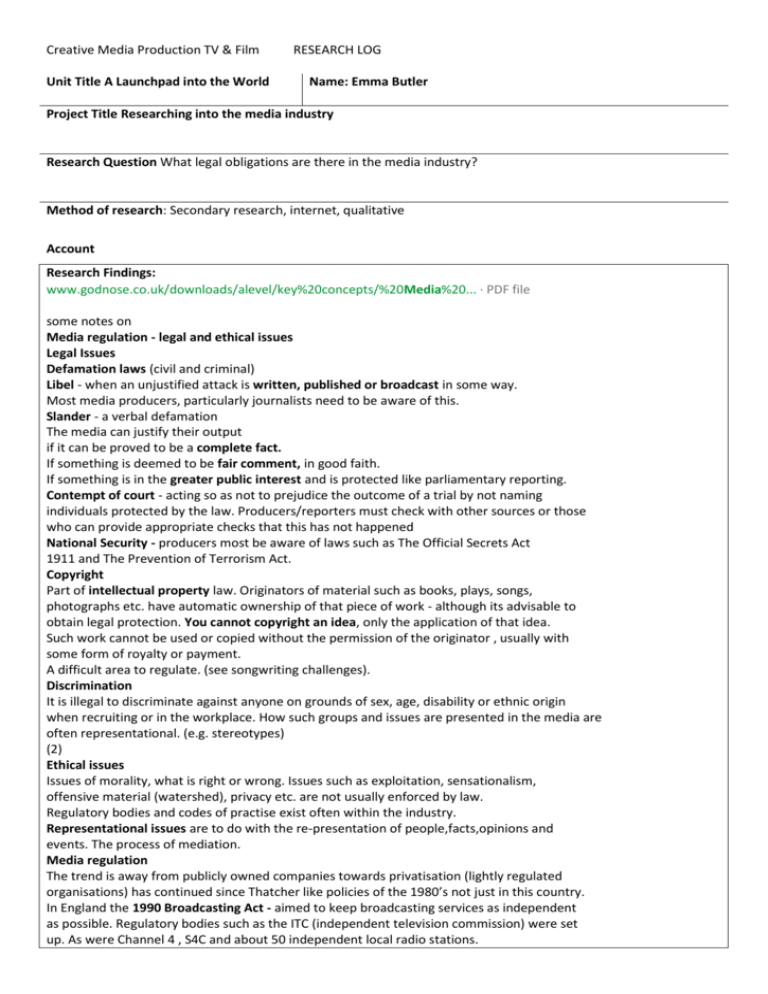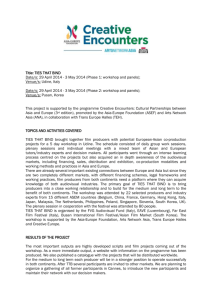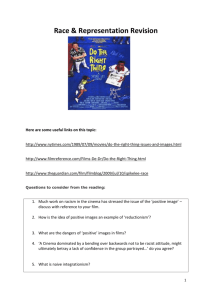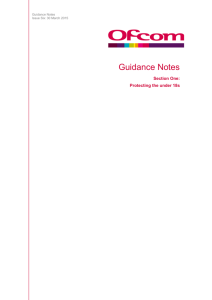File
advertisement

Creative Media Production TV & Film Unit Title A Launchpad into the World RESEARCH LOG Name: Emma Butler Project Title Researching into the media industry Research Question What legal obligations are there in the media industry? Method of research: Secondary research, internet, qualitative Account Research Findings: 1. www.godnose.co.uk/downloads/alevel/key%20concepts/%20Media%20... · PDF file some notes on Media regulation - legal and ethical issues Legal Issues Defamation laws (civil and criminal) Libel - when an unjustified attack is written, published or broadcast in some way. Most media producers, particularly journalists need to be aware of this. Slander - a verbal defamation The media can justify their output if it can be proved to be a complete fact. If something is deemed to be fair comment, in good faith. If something is in the greater public interest and is protected like parliamentary reporting. Contempt of court - acting so as not to prejudice the outcome of a trial by not naming individuals protected by the law. Producers/reporters must check with other sources or those who can provide appropriate checks that this has not happened National Security - producers most be aware of laws such as The Official Secrets Act 1911 and The Prevention of Terrorism Act. Copyright Part of intellectual property law. Originators of material such as books, plays, songs, photographs etc. have automatic ownership of that piece of work - although its advisable to obtain legal protection. You cannot copyright an idea, only the application of that idea. Such work cannot be used or copied without the permission of the originator , usually with some form of royalty or payment. A difficult area to regulate. (see songwriting challenges). Discrimination It is illegal to discriminate against anyone on grounds of sex, age, disability or ethnic origin when recruiting or in the workplace. How such groups and issues are presented in the media are often representational. (e.g. stereotypes) (2) Ethical issues Issues of morality, what is right or wrong. Issues such as exploitation, sensationalism, offensive material (watershed), privacy etc. are not usually enforced by law. Regulatory bodies and codes of practise exist often within the industry. Representational issues are to do with the re-presentation of people,facts,opinions and events. The process of mediation. Media regulation The trend is away from publicly owned companies towards privatisation (lightly regulated organisations) has continued since Thatcher like policies of the 1980’s not just in this country. In England the 1990 Broadcasting Act - aimed to keep broadcasting services as independent as possible. Regulatory bodies such as the ITC (independent television commission) were set up. As were Channel 4 , S4C and about 50 independent local radio stations. Creative Media Production TV & Film RESEARCH LOG Channel 3 ITV, was released from its obligation to act as a public service.(C 4 still has this role) BBC required to commission 25% of broadcast material from independent producers. Led to ‘producers choice’ the increased use of outside production facilities. (cheapest) Direct Consequences of the Act on Broadcasters * Production base of BBC and major channel 3 companies has shrunk * British Broadcasters make some types of programmes with co-production deals (often with overseas broadcasters * More small independent companies * Broadcast staff more likely to be freelance or employed on fixed term contracts. Regulatory bodies and codes of practise There are a number of bodies who have been appointed to oversee the regulatory framework within which the UK Media operate. These include; ITC & Radio Authority , British Board of film classification (BBFC), Monopolies and Mergers Commission, Press Complaints Commission (PPC) Advertising Standards Authority (ASA) ITC - set up by the 1990 broadcasting act Awards licences to independent broadcasters inc. cable and satellite. Regulates content. The Radio Authority does much the same thing for Independent radio. (3) The British Board of Film Classification An independent, non government body which establishes the classification of films. It is local authorities who decide whether to show a film in their area, although they usually follow the BBFC,s advice. Some important laws have to be adhered to incl. the Obscene publications act , The Cinematograph Film (Animals ) act (1937) , blasphemy, libel and the Protection of Children Act 1978. Issues of censorship - Who censors ? the board, individual, parents, government. ? cultural factors - Why censor ? do we need censorship , in what areas. Issues of freedom and public interest Issues rarely clear cut. see areas of propaganda, new media, individual preference. The competition commission (1999) (replaced the monopolies & mergers commission) Set up to ensure that no company has too much control over the sensitive media industries. Becoming increasingly important, due to trends in cross media ownership. Press Complaints Commission Created by the newspaper industry itself in 1991, replaced the press council. following criticism over intrusions of privacy. Its role today includes the following areas; (based on the 1993 Code of Practise) the right to reply - gives people or organisations the right to reply to criticism in the press. Although this is not enshrined in law. chequebook journalism - to do with bribing people to give exclusive stories to newspapers Other areas include - printing inaccurate, misleading or distorted material. Newspapers are expected to distinguish between comment, conjecture and fact. Other issues include privacy , use of listening devices , misrepresentation , harassment, discrimination and the interviewing and photographing of children. Advertising Standards Authority The ASA code demands that advertising is Legal, Decent, Honest and Truthful. http://en.wikipedia.org/wiki/Media_ethics#Ethics_of_entertainment_media Issues in the ethics of entertainment media include: The depiction of violence and sex, and the presence of strong language. Ethical guidelines and legislation in this area are common and many media (e.g. film, computer games) are subject to ratings systems and supervision by agencies. An extensive guide to international systems of enforcement can be found under motion picture rating system. Creative Media Production TV & Film RESEARCH LOG Product placement. An increasingly common marketing tactic is the placement of products in entertainment media. The producers of such media may be paid high sums to display branded products. The practice is controversial and largely unregulated. Detailed article: product placement. Stereotypes. Both advertising and entertainment media make heavy use of stereotypes. Stereotypes may negatively affect people's perceptions of themselves or promote socially undesirable behavior. The stereotypical portrayals of men, affluence and ethnic groups are examples of major areas of debate. Taste and taboos. Entertainment media often questions of our values for artistic and entertainment purposes. Normative ethics is often about moral values, and what kinds should be enforced and protected. In media ethics, these two sides come into conflict. In the name of art, media may deliberately attempt to break with existing norms and shock the audience. That poses ethical problems when the norms abandoned are closely associated with certain relevant moral values or obligations. The extent to which this is acceptable is always a hotbed of ethical controversy. See: Turner Prize, obscenity, freedom of speech, aesthetics. Further Research and Changes to the Research Plan:









